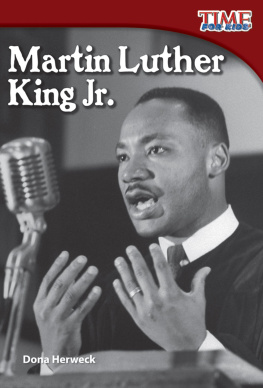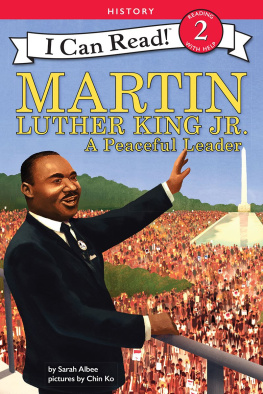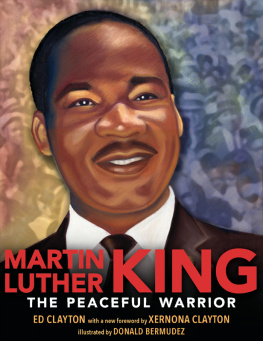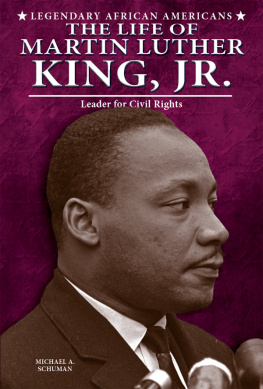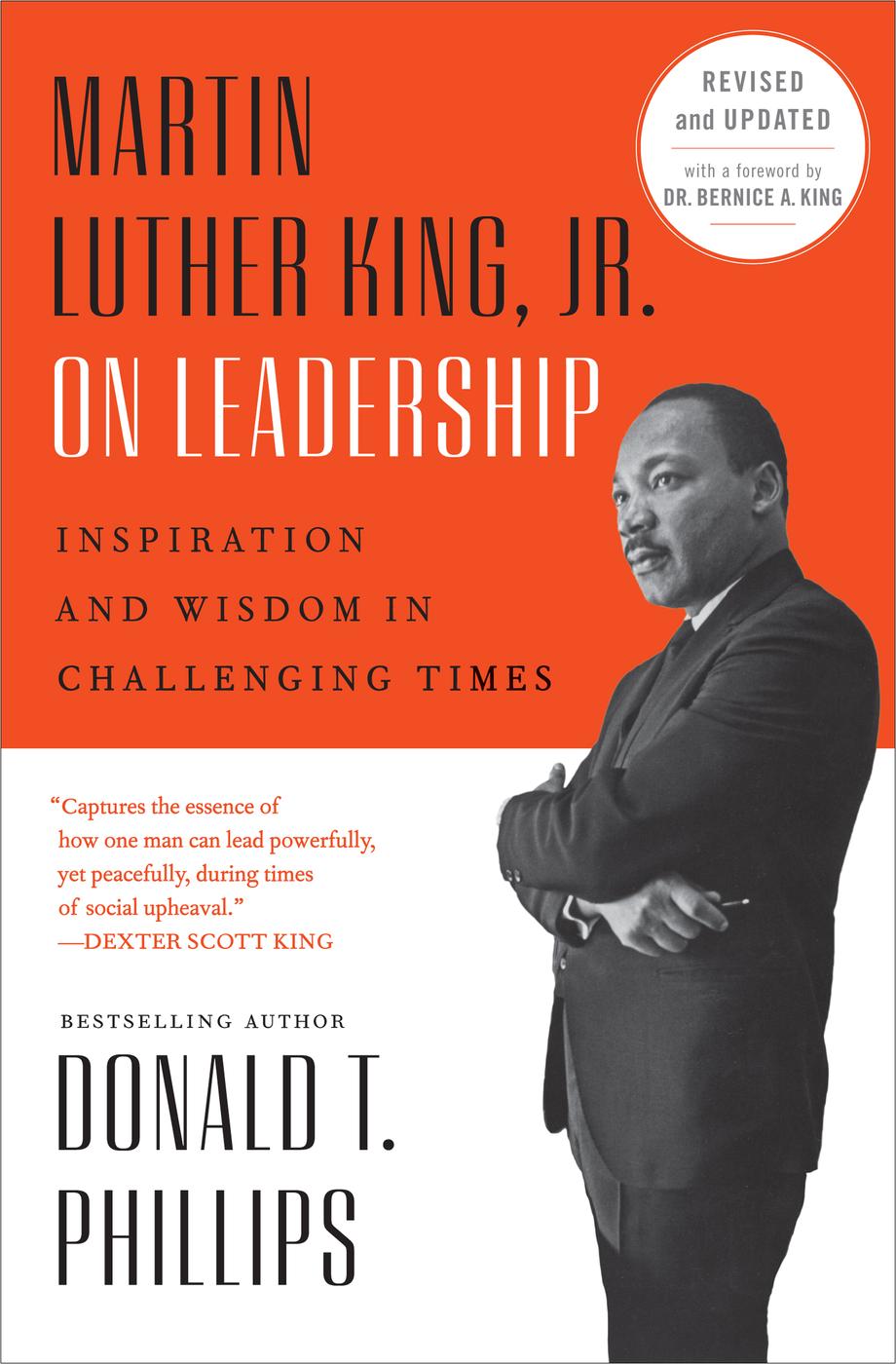
Copyright 1999 by Donald T. Phillips
Foreword copyright 2021 by Rev. Dr. Bernice A. King, CEO of The MLK, Jr. Center of Nonviolent Social Change
Preface copyright 2021 by Donald T. Phillips
Cover design by Alison Forner. Cover photo from Bob Fitch Photography Archive, Stanford University Libraries. Cover copyright 2021 by Hachette Book Group, Inc.
Hachette Book Group supports the right to free expression and the value of copyright. The purpose of copyright is to encourage writers and artists to produce the creative works that enrich our culture.
The scanning, uploading, and distribution of this book without permission is a theft of the authors intellectual property. If you would like permission to use material from the book (other than for review purposes), please contact permissions@hbgusa.com. Thank you for your support of the authors rights.
Grand Central Publishing
Hachette Book Group
1290 Avenue of the Americas, New York, NY 10104
grandcentralpublishing.com
twitter.com/grandcentralpub
Originally published in hardcover in 1999
Revised and Updated Trade Paperback Edition: August 2021
Grand Central Publishing is a division of Hachette Book Group, Inc. The Grand Central Publishing name and logo is a trademark of Hachette Book Group, Inc.
The publisher is not responsible for websites (or their content) that are not owned by the publisher.
The Hachette Speakers Bureau provides a wide range of authors for speaking events. To find out more, go to www.hachettespeakersbureau.com or call (866) 376-6591.
Library of Congress Cataloging-in-Publication Data has been applied for.
ISBNs: 978-1-5387-0557-5 (trade paperback), 978-0-7595-2109-4 (ebook)
E3-20210629-DA-ORI
Explore book giveaways, sneak peeks, deals, and more.
Tap here to learn more.

A t this moment in history, when looking across America, and indeed the world, it is obvious that we the people are experiencing a void of moral leadership. Our nation is fraught with vitriol, divisiveness, racism, white supremacy, hatred, neo-Nazism, misogyny, poverty, and unemployment. Moreover, we are amid the global COVID-19 pandemic, during which more people have died from the disease in America than in any other nation. These are difficult times, and our country is in desperate need of moral and just leaders. Nevertheless, despite all that is occurring, I remain hopeful, because this is not the first time that our nation has faced such challenges.
There are several reasons why I remain hopeful. Although weve experienced an unimaginable start to the year 2021, more than five decades after my fathers assassination, I am hopeful because my mother, Coretta Scott King, helped us to understand that Struggle is a never-ending process. Freedom is never really won; you earn it and win it in every generation. I remain hopeful because through my father, our nation has experienced what an authentic moral and just leader looks like. Even though he is not with us, thanks be to God and my mothers leadership, his own words and information about his leadership principles endure to show us a more excellent way.
Within the pages of this book, you will find invaluable wisdom, along with profound and insightful information about my fathers leadership, that I believe will inspire and give you hope as well. In fact, Donald Phillips makes one vital point that I want to call to your attention.
Martin Luther King, Jr.s, principles of leadership are appropriate for all times, for all leaders in any situation with any organization. But they are especially effective during tough timeswhen there is major transition taking place, a major period of change.
This powerful statement gets my wholehearted agreement. It is as timely and relevant today as it was in 1999, when this book was originally published. Why? Because at this point in history, America is experiencing the same type of tough times that my father nonviolently fought as he led the civil rights movement of his generation. Undeniably, if there was ever a time for the type of leadership exemplified by my father, it is in this fierce urgency of now. Consequently, in my humble opinion, there could not be a more appropriate time than now for the re-release of Martin Luther King, Jr., on Leadership: Inspiration and Wisdom for Challenging Times.
Martin Luther King, Jr., was, and remains, one of this nations greatest leaders, and the impact of his transformative, moral, and nonviolent leadership is global. His words and the effectiveness of the principles he lived by are timeless. In fact, on August 26, 2013, during the commemoration of the fiftieth anniversary of his I Have a Dream speech, my father was described as Architect of the 21st Century. He did not live to see this century, but his words depicted the troubling times we are experiencing, and he left us a blueprint to address what needs to be done. He had much to say through his words and example, and those of us who are leaders, or aspire to be, should listen, take note, and apply his teachings.
There are many facets to my fathers leadership, and within this book Donald Phillips has captured the essence of what made him such a great leader. From the preface to the epilogue, you will find details covering his moral preparation; the impact of growing up with a father and grandfather who were strong social justice leaders; how he loved to learn; how he strategized and mobilized; how he handled successes and failures; and the effectiveness of his speeches, sermons, and communications; just to name a few. As you turn the pages, you will discover a plethora of information regarding my fathers leadership aspects, but there are three that I want to highlight here: His use of love, language, and nonviolence.
Love
As I was only five years old at the time of my fathers assassination, most of what I know about his leadership came from what my mother shared with me, watching documentaries and films about him, reading all the books he personally wrote, and books that others have written about him. I was also privileged through the years to have conversations with other family members, leaders, and foot soldiers who fought the good fight along with him, like my aunt, Dr. Christine King Farris, Ambassador Andrew Young, Congressman John Lewis, Rev. Dr. C. T. Vivian, Rev. Willie Bolden, James Orange, Dorothy Height, and many others. In every instance, when I consider all that I received and learned about my fathers life and leadership, what authentically stood out was his strength to love unconditionally, even his adversaries.
When describing strong, courageous, and effective leaders, we may not tend to use the word love, but for me, love is essentially the word that best explains my fathers effectiveness as a moral, transformative, and nonviolent leader. Love was the foundation of his leadership. The love that I speak about is the type of love described in 1 Corinthians 13 of the Bible: Love is patient, love is kind. It does not envy, it does not boast, it is not proud. It does not dishonor others, it is not self-seeking, it is not easily angered, it keeps no record of wrongs. Love does not delight in evil but rejoices with the truth. It always protects, always trusts, always hopes, always perseveres. These Agape love characteristics were embedded in my fathers lifestyle and were evident throughout his leadership. He was a man who had a heart for God and all of Gods people.




